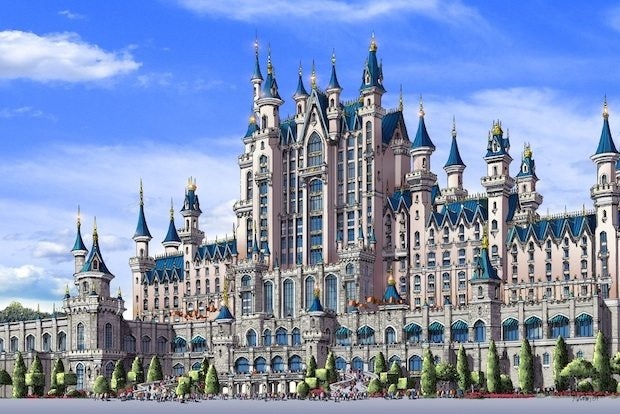
A rendering of the newly announced Dusit Thani Castle Fushun, which is slated to open in 2017.
It’s well known that many Chinese real estate developers love copying iconic European architecture. From Hangzhou’s fake Paris—complete with a replica Eiffel Tower—to a mini Austrian village in Huizhou, home-buyers can get a slice of almost any classic European style without ever having to leave China.
A new resort plan just announced for Liaoning province may be one of the grandest projects yet to follow this trend. Thailand-based hotel and resort company Dusit recently inked a deal with China’s Everfashion Group to manage a castle hotel that will be part of a 3.5-square-kilometer resort complex.
The Dusit Thani Castle Fushun will be located within the Hot Go Park in Fushun city near Shenyang. When completed in January 2017, the park will be one of China’s largest resorts, featuring a massive array of recreational activities that include both a “Balinese–style Water World” and a ski resort all in the same place. The hotel will feature 450 rooms, which will house some of the 80,000 expected daily visitors to the park.
China’s penchant for “duplitechture” may seem odd, but BBC notes that the trend mirrors a similar one that took place in the United States not so long ago:
Of course, it's not just the Chinese who love to copy. A century and a half ago, the rapidly progressing United States was a hub of counterfeiting and copying and it too has a host of more recent architectural replicas, including country pavilions in Epcot in Florida, and plenty of examples in Las Vegas.
That makes the copycat work that went into this hotel particularly meta. The rendering is not unlike the castle hotel in Disneyworld’s Magic Kingdom resort in Florida, meaning that this may be a copy of a structure that was created during America's own Europe obsession.
Furthermore, author Bianca Bosker, who has written a book on architectural mimicry in China, told BBC that copying is not frowned upon in China. Rather, it’s seen as a form of “mastery.” According to her, "China is, in a very symbolic way, showing off its ability to rearrange the cosmos, to sort of own the greatest hits of the West."
However, many Chinese architecture elites would no doubt still see the style as tacky. Luckily, China is certainly not lacking in amazing, innovative projects that combine cutting-edge design with elements of China’s own architectural heritage.